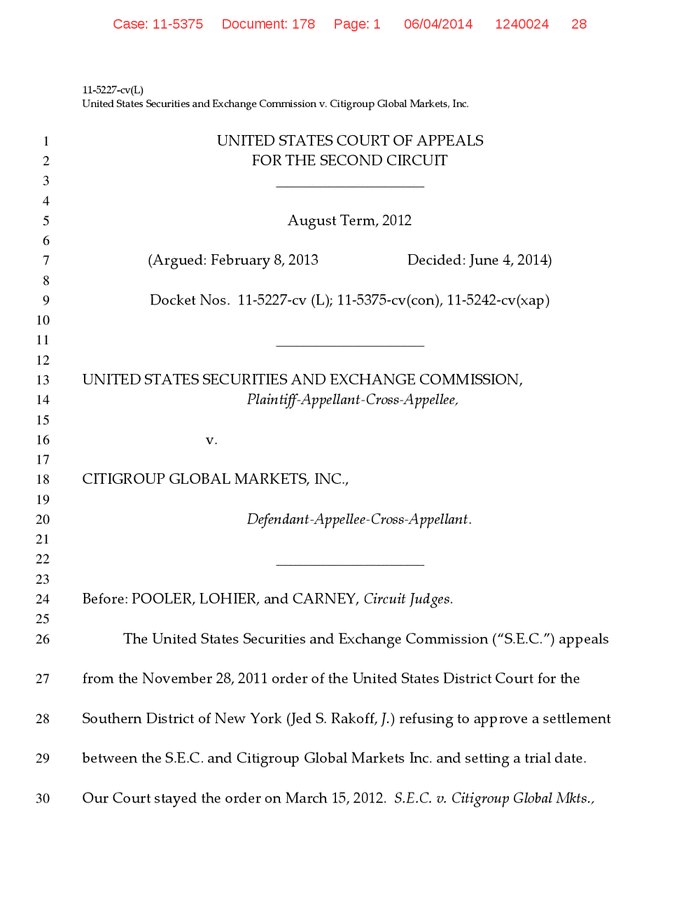
Almost three years ago, a New York federal judge, Jed Rakoff, refused to approve a settlement between Citigroup and the Securities and Exchange Commission. He described the $285 million payment as "pocket change to any entity as large as Citigroup." Citigroup had settled charges that it had misled investors in a $1 billion security based on mortgages that failed months after it was created. Citi made $160 million in fees and profits from taking the other side of the investors, the SEC said.
And now it's been overturned by an appeals court, and sent back to Rakoff, where it will likely — but not necessarily — be approved. The three judge panel for the United States Court of Appeals for the Second Circuit said in an opinion released Wednesday that the district court judge, Rakoff, had "abused its discretion in applying an incorrect legal standard in its review," of the SEC's settlement.
The opinion, written by Judge Raymond Pooler, is harshly worded by the standards of legal prose and contained what amounts to stinging criticism of one the most prominent and respected trial judges in the federal court system.
The panel wrote that "the district court did not accord the SEC's judgement adequate deference" and that trial court judges should focus on whether consent decrees are "procedurally proper... taking care not to infringe on the SEC's discretionary authority to settle on a particular set of terms." Whether or not a consent decree is in the public interest, the panel said, "rests squarely with the SEC, and its decisions merits significant deference."
"This is a win for the SEC, they got the ruling they wanted, the public interest is something they get to resolve," Tom Gorman, a partner at Dorsey & Whitney told BuzzFeed.
"We are pleased with today's ruling by the Second Circuit Court of Appeals reaffirming the significant deference accorded to the SEC in determining whether to settle with parties and on what terms," the SEC's enforcement director Andrew Ceresney said in a statement.
Rakoff's clear writing, forthright criticism of the SEC, and his description of the $285 million settlement — which was far smaller than the $550 million Goldman Sachs paid to settle a similar case — as "a very good deal for Citigroup," and at worst, "a mild and modest cost of doing business," quickly made him one of the most prominent non-Supreme Court justices in the country and a lodestar for critics who thought the SEC wasn't being harsh enough with large banks.
A liberal Washington Post opinion writer called Rakoff's opinion "courageous," and widely-read finance blogger Felix Salmon wrote that after reading parts of the initial opinion, "one wants to stand up and applaud loudly."
Rakoff referred to the SEC's policy of allowing defendants to enter into judgments with SEC, where they pay fines and agree to change their behavior but don't admit to the truth of the SEC's charges against them, as "hallowed by history, but not by reason." He also described the SEC's consent judgement with Citi as "neither fair, nor reasonable, nor adequate, nor in the public interest." Rakoff also said that while judges should give "substantial deference to the views of an administrative body," in determining whether a settlement was in the public interest, he argued that judges "must still exercise a modicum of independent judgment."
While the panel said judges have some role in determining whether consent decree serves the public interest, Rakoff's erred in basing his opinion on a "disagreement with the SEC's decisions on discretionary matters of policy," like in his criticism of the settlement as not containing enough admission of facts and wrongdoing by Citi.
Following Rakoff's criticism of the SEC's no-admit, no-deny policy, the SEC publicly changed the policy, with then-newly installed chief Mary Jo White saying she would seek admissions of wrongdoing in some cases. Tom Gorman, a partner at Dorsey & Whitney told BuzzFeed, "The Citigroup case really sparked a long running debate about the policy which is probably what led to its current form."
"While the SEC has and will continue to seek admissions in appropriate cases, settlements without admissions also enable regulatory agencies to serve the public interest by returning money to harmed investors more quickly, without the uncertainty and delay from litigation and without the need to expend additional agency resources," Ceresney said.

